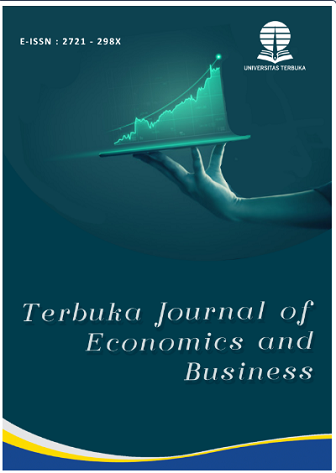The Effect of Forest Area, Energy Consumption, Control of Corruption, and Economic Growth on Carbon Emissions in G7 Countries
DOI:
https://doi.org/10.33830/tjeb.v5i1.7263Keywords:
Forest area, Ad hoc Committee, Control of corruption, Economic Growth, Carbon EmissionsAbstract
This research aims to determine the influence of Forest Area, Energy Consumption, Control of Corruption, and Economic Growth on Carbon Emissions. This study uses panel data published by the World Bank and Our World in Data for the 2014-2020 period in the G7 countries, namely America, Italy, United Kingdom, France, Japan, Canada and Germany. In this study, the carbon emissions variable is used as the dependent variable. Forest area, energy consumption, Control of Corruption, and economic growth as independent variables. The analysis technique for this panel research uses panel data regression with a fixed effect model (FEM) approach. The research results show that forest area, energy consumption simultaneously and partially influence carbon emissions in G7 countries. Meanwhile, control of corruption and economic growth have a positive and insignificant effect on carbon emissions.
References
Alanazi, N. D. N., Dmitriy, Z., & Polyakova, A. G. (2020). Estimating the impact of energy consumption on carbon emissions using environmental kuznets curve. International Journal of Energy Economics and Policy, 10(5), 608–614. https://doi.org/10.32479/ijeep.10244
Fadhli, R., Sugianto, S., & Syakur, S. (2021). Analisis Perubahan Penutupan Lahan dan Potensi Karbon di Taman Hutan Raya Pocut Meurah Intan, Aceh Indonesia. Jurnal Ilmu Lingkungan, 19(2), 450–458. https://doi.org/10.14710/jil.19.2.450-458
Farhan, A. (2021). Pengaruh Agrikultura Dan Industri Pada Emisi Karbon Studi Negara-Negara Asia Tahun 2010 - 2016. Media Mahardhika, 19(2), 230–237. https://doi.org/10.29062/mahardika.v19i2.250
Fauzi, R. (2017a). Pengaruh Konsumsi Energi, Luas Kawasan Hutan dan Pertumbuhan Ekonomi terhadap Emisi CO di 6(Enam)NegaraAnggota ASEAN : PendekatanAnalisis Data Panel 2 Effects of Energy Consumption, Forest Areas and Economic Growth toward CO emissions in 6 (six) ASEAN Mem. 11(1), 1–52. Retrieved from http://data.worldbank.org/
Fauzi, R. (2017b). Pengaruh Konsumsi Energi, Luas Kawasan Hutan dan Pertumbuhan Ekonomi terhadap Emisi CO di 6(Enam)NegaraAnggota ASEAN : PendekatanAnalisis Data Panel 2 Effects of Energy Consumption, Forest Areas and Economic Growth toward CO emissions in 6 (six) ASEAN Mem. 11(1), 1–52.
Internasional, K. P., Emisi, T., Dioksida, K., Di, C. O., & Asean, N. (2021). Pengaruh pertumbuhan ekonomi, populasi penduduk kota, keterbukaan perdagangan internasional terhadap emisi karbon dioksida (co 2 ) di negara asean. 3(1), 37–47.
Ivungu, J. A., Ganyam, A. I., Agbo, A., & Ola, P. O. (2020). Effect of Treasury Single Account (TSA) on Corruption in the Nigerian Public Sector. International Journal of Academic Research in Business and Social Sciences, 10(3), 43–53. https://doi.org/10.6007/ijarbss/v10-i3/7021
Klepacka, A. M. (2020). Agricultural Land Afforestation Implemented Under the Rural Development Programme in Poland Between 2007-2013 and 2014-2020. Annals of the Polish Association of Agricultural and Agribusiness Economists, XXII(1), 137–148. https://doi.org/10.5604/01.3001.0013.9132
Kudus, K., & Rahman, R. (2013). Economics Development Analysis Journal. 2(1), 1–8.
Kurniarahma, L., Laut, L. T., & Prasetyanto, P. K. (2018). Analisis Faktor-Faktor yang Mempengaruhi Emisi Co 2 di Indonesia (Analysis of Factors Affecting Co 2 Emissions in Indonesia). 2.
Maulidina, W., & Maulana, I. (2022). Pengaruh Gross Domestic Product (GDP) terhadap Emisi Karbon dioksida (CO2) dan Forest Area di 3 (Tiga) Negara ASEAN. Masyrif : Jurnal Ekonomi, Bisnis Dan Manajemen, 3(2), 205–215. https://doi.org/10.28944/masyrif.v3i2.828
Nguyen, H. T. T., Van Nguyen, C., & Van Nguyen, C. (2020). The effect of economic growth and urbanization on poverty reduction in Vietnam. Journal of Asian Finance, Economics and Business, 7(7), 229–239. https://doi.org/10.13106/jafeb.2020.vol7.no7.229
Norsujianto, T. (2015). Konversi Limbah Plastik Menjadi Minyak Sebagai Bahan Bakar Energi Baru Terbarukan. Elemen : Jurnal Teknik Mesin, 1(1), 05. https://doi.org/10.34128/je.v1i1.21
Pratama, B. A., Ramadhani, M. A., Lubis, P. M., & Firmansyah, A. (2022). Implementasi Pajak Karbon Di Indonesia: Potensi Penerimaan Negara Dan Penurunan Jumlah Emisi Karbon. JURNAL PAJAK INDONESIA (Indonesian Tax Review), 6(2), 368–374. https://doi.org/10.31092/jpi.v6i2.1827
Puntoon, W., Tarkhamtham, P., & Tansuchat, R. (2022). The impacts of economic growth, industrial production, and energy consumption on CO2 emissions: A case study of leading CO2 emitting countries. Energy Reports, 8, 414–419. https://doi.org/10.1016/j.egyr.2022.10.219
Salsabila, I., Amalina, N., Wahyudi, H., & Ciptawaty, U. (2023). Pengaruh GDP Per Kapita , dan Konsumsi Energi Terhadap Emisi CO2 di Indonesia. 06(01), 6508–6517.
Sekar Palupi, P. G., Muchtar, M., & Sihombing, P. R. (2023). Pengaruh Pajak Karbon, Penggunaan Bahan Bakar Fosil, Dan Pertumbuhan PDB Terhadap Emisi Karbon. Jurnalku, 3(2), 119–127. https://doi.org/10.54957/jurnalku.v3i2.385
Sekrafi, H. (2018). The e ff ect of corruption on carbon dioxide emissions and energy consumption in Tunisia. 2(1), 81–95. https://doi.org/10.1108/PRR-11-2016-0008
Sri nawatmi. (2013). KORUPSI DAN PERTUMBUHAN EKONOMI - STUDI EMPIRIS 33 PROVINSI DI INDONESIA. 2.
Sriningsih, M., Hatidja, D., & Prang, J. D. (2018). Penanganan Multikolinearitas Dengan Menggunakan Analisis Regresi Komponen Utama Pada Kasus Impor Beras Di Provinsi Sulut. Jurnal Ilmiah Sains, 18(1), 18. https://doi.org/10.35799/jis.18.1.2018.19396
The Global Economy. (2020). Ranking Forest Area G7.
Tirtana, D. (2023). Potensi Pertumbuhan Ekonomi di Pulau Jawa dan Bali. WELFARE Jurnal Ilmu Ekonomi, 3(2), 148–157. https://doi.org/10.37058/wlfr.v3i2.6064
Tsandra, N. A., Sunaryo, R. P., Octaviani, D., Ekonomi, F., & Trisakti, U. (2021). Pengaruh Konsumsi Energi dan Aktivitas Ekonomi Terhadap Emisi CO2 di Negara G20 ( The Effect of Energy Consumption and Economic Activity on CO2 Emissions in G20 Countries ). 10(2), 69–79.
Welsch, H. (2004). Corruption, growth and the environment. Environment and DevelopmentEconomics. 9.
WELSCH, H. (2004). Corruption, growth, and the environment: a cross-country analysis. Environment and Development Economics, 9(5), 663–693. https://doi.org/10.1017/S1355770X04001500
Yusril Izha Mahendra, Marselina, Heru Wahyudi, & Ukhti Ciptawati. (2022). Pengaruh Populasi Penduduk, FDI dan Control of Corruption terhadap Emisi CO2 di 9 Negara ASEAN. Jurnal Multidisiplin Madani, 2(10), 3741–3753. https://doi.org/10.55927/mudima.v2i10.1462
Zhang, J. (2021). Environmental Kuznets Curve Hypothesis on CO 2 Emissions : Evidence for China.
Downloads
Published
How to Cite
License
Copyright (c) 2024 Terbuka Journal of Economics and Business

This work is licensed under a Creative Commons Attribution-ShareAlike 4.0 International License.




